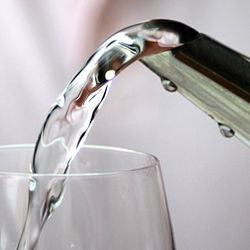Water intoxication
(Redirected from Water Intoxication)
Editor-In-Chief: Prab R Tumpati, MD
Obesity, Sleep & Internal medicine
Founder, WikiMD Wellnesspedia &
W8MD medical weight loss NYC and sleep center NYC
| Water intoxication | |
|---|---|

| |
| Synonyms | Water poisoning, hyperhydration, overhydration |
| Pronounce | |
| Specialty | Nephrology, Emergency medicine |
| Symptoms | Nausea, vomiting, headache, confusion, seizures, coma |
| Complications | Cerebral edema, hyponatremia |
| Onset | Rapid, within hours |
| Duration | Variable, depending on treatment |
| Types | N/A |
| Causes | Excessive water intake, psychogenic polydipsia, ecstasy use |
| Risks | Endurance sports, schizophrenia, MDMA use |
| Diagnosis | Blood test showing low sodium levels |
| Differential diagnosis | Hyponatremia, SIADH, diabetes insipidus |
| Prevention | Monitoring fluid intake, electrolyte balance |
| Treatment | Fluid restriction, intravenous saline |
| Medication | N/A |
| Prognosis | Good with prompt treatment |
| Frequency | Rare |
| Deaths | N/A |
Water intoxication, also known as water poisoning or hyperhydration, is a potentially lethal disturbance in brain function that results from the overconsumption of water. It disturbs electrolyte balance, specifically causing hyponatremia (Hyponatremia), or low sodium concentration in the blood.
Pathophysiology
- In a normal state, water and electrolytes are balanced through homeostatic mechanisms involving the kidneys, adrenal glands, and hormones such as vasopressin (antidiuretic hormone). When excessive amounts of water are consumed, the kidneys may be unable to excrete enough fluid. As a result, water levels increase in the blood, diluting the electrolytes, particularly sodium. Sodium plays a crucial role in maintaining the fluid balance both inside and outside cells.
- When sodium concentration drops due to water retention, a condition called hyponatremia ensues. This causes water to move from the extracellular space into cells, leading to cellular edema. Neurons in the brain are particularly affected, leading to potentially life-threatening cerebral edema.
Causes and Risk Factors
- Water intoxication typically results from drinking excessive amounts of water in a short period. It can occur during water drinking contests or high-intensity activities such as marathons, where large volumes of fluid are consumed to counteract dehydration. Certain psychiatric conditions, such as psychogenic polydipsia, also predispose individuals to water intoxication.
- In addition, medical conditions that impair excretion of water can increase the risk of water intoxication. These include kidney disease, heart failure, and certain forms of diabetes.
Clinical Presentation
Symptoms of water intoxication may start with mild headache, nausea, vomiting and changes in mental status such as confusion or disorientation. As the condition progresses, it can lead to muscle weakness, seizures, unconsciousness, and in severe cases, coma or death.
Diagnosis
The diagnosis of water intoxication is based on patient history, clinical presentation, and laboratory findings. Key diagnostic indicators include a history of excessive water intake, symptoms of hyponatremia, and abnormally low sodium levels in the blood.
Treatment
The treatment of water intoxication aims to restore sodium balance in the body. This often involves restricting fluid intake and addressing the underlying cause. In severe cases, intravenous hypertonic saline may be administered to rapidly increase serum sodium levels.
Prognosis and Prevention
- Prompt recognition and treatment of water intoxication generally lead to a favorable prognosis. However, severe cases can be life-threatening, particularly if cerebral edema leads to brain damage.
- Prevention of water intoxication focuses on educating individuals about the dangers of excessive water consumption and promoting healthy hydration habits.
See Also
References
- Hew-Butler, T., Rosner, M. H., Fowkes-Godek, S., Dugas, J. P., Hoffman, M. D., Lewis, D. P., ... & Hoffman, M. D. (2015). Statement of the Third International Exercise-Associated *Hyponatremia Consensus Development Conference, Carlsbad, California, 2015. Clinical Journal of Sport Medicine, 25(4), 303-320.
- Avis, H. J., Vyth, O. L., Stassen, R. E., & van Veen, T. A. (2020). Systematic review of the mechanism of injury in paediatric washing machine accidents. Injury, 51(1), 15-19.
Transform your life with W8MD's budget GLP-1 injections from $125.
W8MD offers a medical weight loss program to lose weight in Philadelphia. Our physician-supervised medical weight loss provides:
- Most insurances accepted or discounted self-pay rates. We will obtain insurance prior authorizations if needed.
- Generic GLP1 weight loss injections from $125 for the starting dose.
- Also offer prescription weight loss medications including Phentermine, Qsymia, Diethylpropion, Contrave etc.
NYC weight loss doctor appointments
Start your NYC weight loss journey today at our NYC medical weight loss and Philadelphia medical weight loss clinics.
- Call 718-946-5500 to lose weight in NYC or for medical weight loss in Philadelphia 215-676-2334.
- Tags:NYC medical weight loss, Philadelphia lose weight Zepbound NYC, Budget GLP1 weight loss injections, Wegovy Philadelphia, Wegovy NYC, Philadelphia medical weight loss, Brookly weight loss and Wegovy NYC
|
WikiMD's Wellness Encyclopedia |
| Let Food Be Thy Medicine Medicine Thy Food - Hippocrates |
Medical Disclaimer: WikiMD is not a substitute for professional medical advice. The information on WikiMD is provided as an information resource only, may be incorrect, outdated or misleading, and is not to be used or relied on for any diagnostic or treatment purposes. Please consult your health care provider before making any healthcare decisions or for guidance about a specific medical condition. WikiMD expressly disclaims responsibility, and shall have no liability, for any damages, loss, injury, or liability whatsoever suffered as a result of your reliance on the information contained in this site. By visiting this site you agree to the foregoing terms and conditions, which may from time to time be changed or supplemented by WikiMD. If you do not agree to the foregoing terms and conditions, you should not enter or use this site. See full disclaimer.
Credits:Most images are courtesy of Wikimedia commons, and templates, categories Wikipedia, licensed under CC BY SA or similar.
Contributors: Prab R. Tumpati, MD

